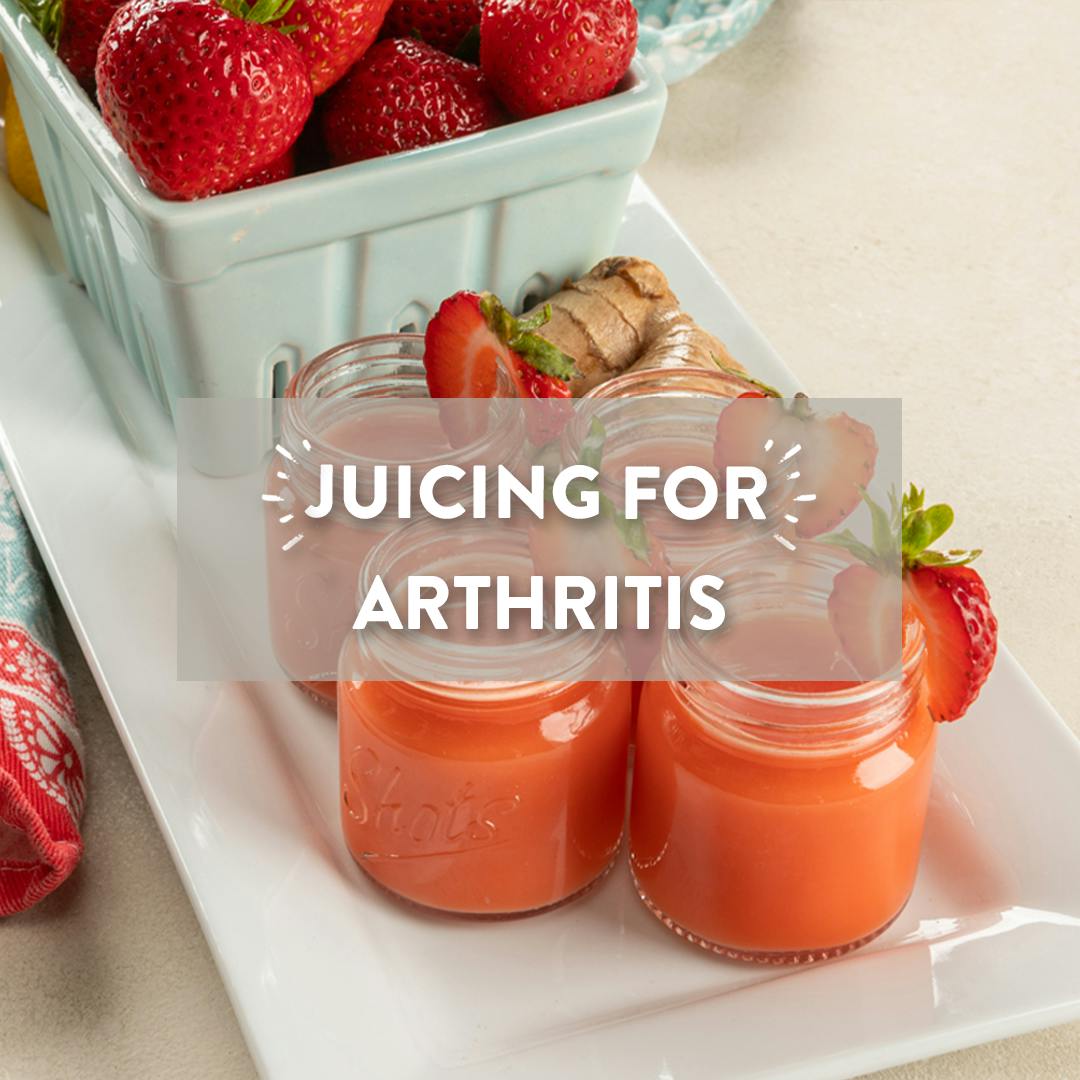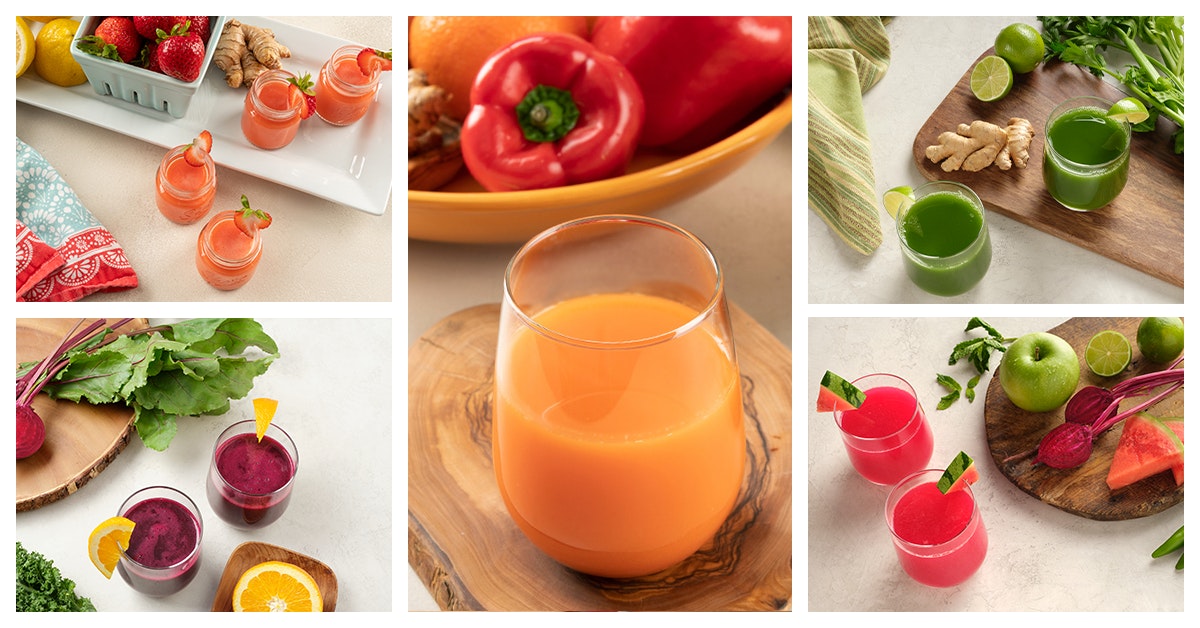Best Juice Ingredients for Arthritis
The antioxidants, vitamins, and other nutrients in fruits and vegetables help most types of arthritis, including osteoarthritis.
Let’s look at all the fruits and vegetables that can be good for arthritis.
- Tart Cherries: Studies, using the concentrated juice of Montmorency cherries found that the flavonoid anthocyanin, which gives them their deep red color, provides powerful antioxidant and anti-inflammatory benefits. In fact, some researchers even compare the anti-inflammatory properties of tart cherries to non-steroidal anti-inflammatory drugs (NSAIDs). The studies indicated that tart cherry juice may relieve the joint pain suffered by people with osteoarthritis (OA) and may reduce flares in those with gout.
- Citrus Fruits: Oranges, grapefruit, lemon, and limes are rich in vitamin C, which is essential for tissue repair. Citrus fruits are also packed with inflammation-fighting antioxidants, which can benefit those with rheumatoid arthritis.
- Strawberries: As with cherries, scientists reckon it is anthocyanin that gives strawberries antioxidant and anti-inflammatory health benefits. Furthermore, strawberries are higher in vitamin C than oranges, and they are naturally low in sugar, both playing key roles in lowering the risk of inflammation that develops into arthritis.
- Peppers: Peppers – regardless of their color or whether they’re hot or mild – are loaded with vitamin C, which preserves bone and protects cartilage cells. Insufficient vitamin C increases the risk for developing OA of the knee.
- Red Raspberries: Like the other red fruits, raspberries are loaded with anthocyanin and vitamin C. Studies have indicated that extracts from red raspberries reduce inflammation and symptoms of OA. Separate research strongly suggests that raspberries’ bioactive compounds lower system-wide inflammation if they form a regular part of the diet.
- Pineapple: Pineapple juice’s anti-inflammatory properties come from an enzyme called bromelain. Many people use bromelain as a dietary supplement to manage inflammation and ease the pain associated with arthritis.
- Watermelon: Studies show that eating watermelon or drinking watermelon juice reduces the inflammatory marker CRP, a protein made by the liver, which increases when inflammation is present. It is also high in beta-cryptoxanthin, a carotenoid that can reduce the risk of rheumatoid arthritis (RA).
- Grapes: Both red, black, and white varieties of grapes are great sources of beneficial polyphenols and antioxidants. Resveratrol, a healthy compound present in both red and black grapes, promotes not only heart health but leading French researchers found it has anti-inflammatory and joint protective qualities.
- Celery: Celery juice is a rich source of plant compounds with anti-inflammatory properties. Adding celery to your fresh juice fix may be useful if you suffer from chronic inflammatory conditions like arthritis.
- Carrots: Carrot juice is a critical source of vitamins, selenium, and β-carotene, which is suggested to protect from risks of Rheumatoid Arthritis (RA).
- Beets: Red beets are rich in the natural pigments, betalains, which can reduce inflammation throughout the whole body and soothe joint pain because it has anti-inflammatory properties. It also makes beet juice a great choice for people with inflammatory conditions like rheumatoid arthritis or fibromyalgia. However, betalains are quite sensitive toward heat, pH, light, and oxygen, which leads to poor stability during processing and storage, so it will only be beneficial if it’s juiced or cold pressed without heat.
Green Juice Ingredients
There are numerous health benefits to adding green juice into your diet, one of which is that it is anti-inflammatory and can lower the risk of arthritis. Although bottles of green juice are easily obtainable in the store, making your own allows you to experiment and make it tastier and more nutritious.
After studying the health effects of cruciferous vegetables for more than a decade, the Mayo Clinic’s findings indicate that eating these antioxidant-rich vegetables can prevent arthritis. They suggest that eating cruciferous vegetables such as broccoli, cauliflower, cabbage, kale, Brussels sprouts, and bok choy lower your risk of developing rheumatoid arthritis.
However, other non-cruciferous vegetables can also help you fight arthritis. Here are a couple more suggestions to add to your green juice:
- Spinach: Spinach is rich in antioxidants, one of which is kaempferol. Test-tube studies indicated that inflammation can be reduced by kaempferol, and other research suggests that spinach has often been linked to improvement of symptoms in people with rheumatoid arthritis.
- Cucumber: Cucumber contains silica that helps strengthen the connective tissues and relieves pain associated with arthritis and gout.
Spices to Add to Anti-Arthritis Juices
Spices have served as traditional medicines for centuries, dating back to ancient civilizations like the Chinese, Greeks, and Egyptians. Since then, some spices have been shown to contain compounds that have medicinal properties, including anti-inflammatory, antioxidant, and antimicrobial effects.
A sprinkle of cinnamon or a dash of turmeric may seem insignificant, but you’d be surprised at the powerful anti-arthritis qualities the following spices provide as additives in healthy, home-produced juices.
- Turmeric: Turmeric is a bright yellow spice popular in Indian cooking. It contains curcumin, which is the active chemical in the turmeric root. Several trials with humans have proved anti-inflammatory benefits like reduced swelling and joint pain.
- Cinnamon: Cinnamon contains cinnamaldehyde and cinnamic acid, both with antioxidant properties that help limit the cell damage typically caused by free radicals. It is suggested that cinnamon, if used in combination with other foods or juices and spices, may offer a cumulative anti-inflammatory effect over the entire course of the day. However, studies say more research is needed to make formal recommendations about how to use cinnamon for relief of arthritis related conditions.
- Ginger: The two chemicals in ginger that block inflammation are gingerol and shogaol. More research is required because while some studies indicated that ginger’s anti-inflammatory properties can also reduce osteoarthritis symptoms, other studies do not support that finding.
- Garlic: The strong taste of garlic is loved by many but hated by some. Regardless, it contains a powerful anti-inflammatory compound, diallyl disulfide, that limits the effects of pro-inflammatory cytokines. Along with helping the body to fight inflammation, garlic may even help prevent arthritis-related cartilage damage. It is important to add fresh garlic to your juice instead of the bottled versions that contain preservatives.
- Cayenne: Chili peppers are the source of cayenne. It is a natural compound with anti-inflammatory properties, called capsaicinoids.
Conclusion
Many adults deal with joint pain on a daily basis. Inflammation can lead to chronic conditions like arthritis. If you don't take steps to address inflammation, you could end up unable to do the things you love due to anything from mild discomfort to pain that is debilitating.
Fortunately, drinking fresh anti-inflammatory juices as a part of a balanced diet gives you the power to limit the risks of arthritis.



Rate and Comment